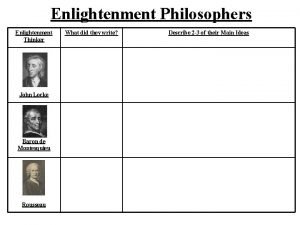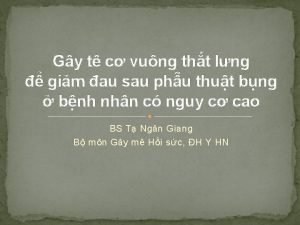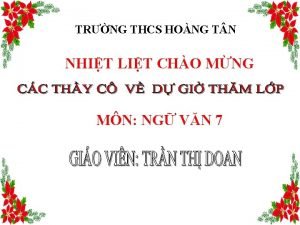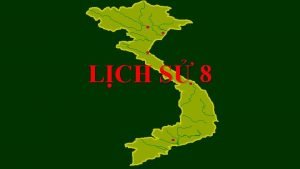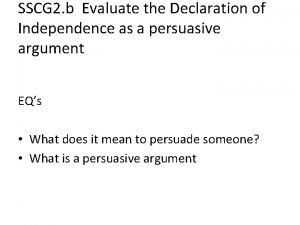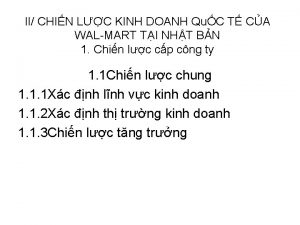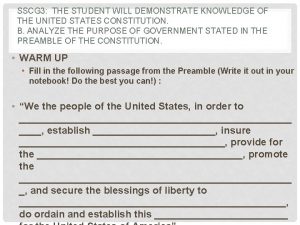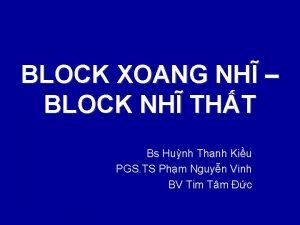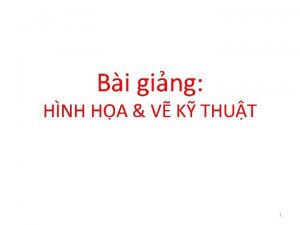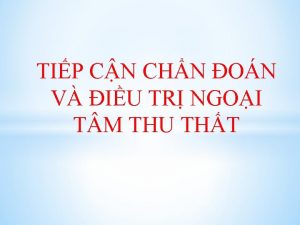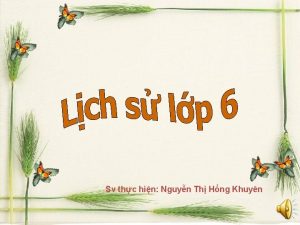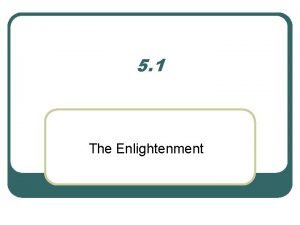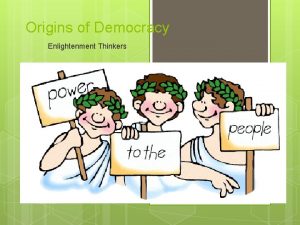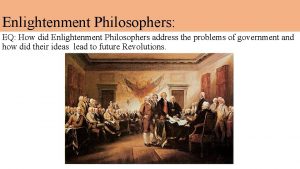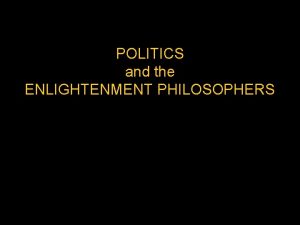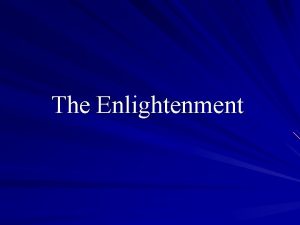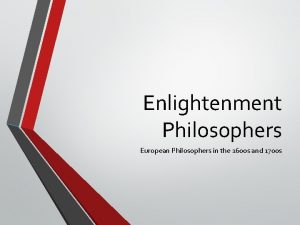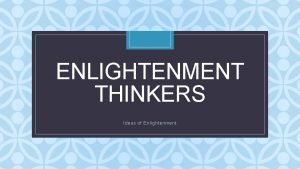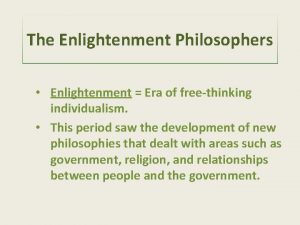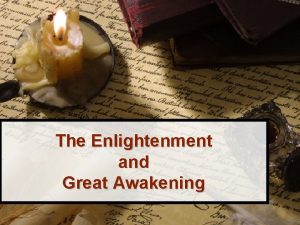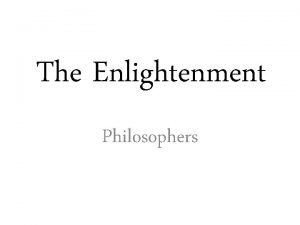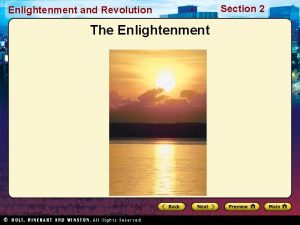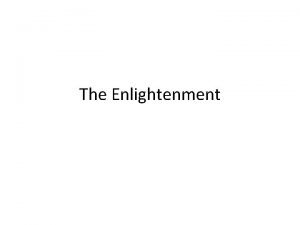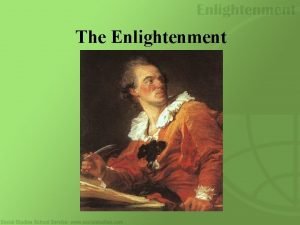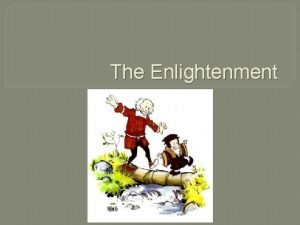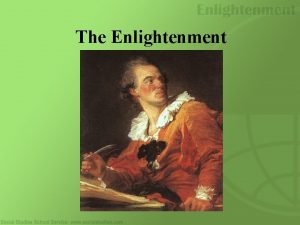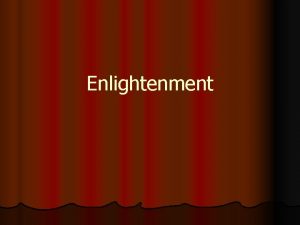ENLIGHTENMENT PHILOSOPHERS IDEAS THAT SHAPED OUR COUNTRY SSCG


















- Slides: 18

ENLIGHTENMENT PHILOSOPHERS IDEAS THAT SHAPED OUR COUNTRY SSCG 1: The student will demonstrate knowledge of the political philosophies that shaped development of US constitutional government.

Is the Velociraptor an Enlightened philosopher? ?

Enlightenment… o You have: Cartoon Notes… PPT FIB Notes Quotes Handout will be homework “Hey this is not only AMAZING- it is important!!” Philosoraptor!

What was the Enlightenment? o Age of Reason o Man began to use reason to explain the world o Used natural laws to explain science, politics and society o Used rational thinking o Rejected the authority of church o Rejected absolute monarchy o "Aude Sapere" (Dare to Think!) SCIENTIFIC METHOD

Scientific Method o Observe Nature, collect data, organize the data, make a prediction, replicate (repeat) the data (experiment) o Enlightenment- can you use the same “Methods” to observe people- society and make things like government “Better”? ? YES YOU CAN!!!


Thomas Hobbes (1588 -1679) o Wrote Leviathan o Man’s natural state was selfish and vulnerable o Each person would serve self-interest at the expense of others o Government is needed to impose peace – by any means – advocated a sovereign (not necessarily a monarch) – he believed you had to give up rights to have a government (to accept a government was only a contract among the governed. )

John Locke (1632– 1704) o Two Treatises on Government o Individuals lived unsuccessfully in a natural state relying only upon their own strength. o They left this to accept a social contract o Government was established by the people to protect their (the people’s natural rights) right to life, liberty, and property

John Locke… o A “Just government” depends on the consent of those who are governed o This support may be withdrawn at any time for serious failures. (… the next guy…Rousseau- believed in this “support” or lack of support as a key issue)

Jean-Jacques Rousseau 1712 -1778 Book: The Social Contract o "Man was born free, and he is everywhere in chains“ o Government is group that makes and enforces rules or laws ensuring liberty and freedom for the people it serves. o Both must follow the obligations of the laws (the contract) o If either fails the government cannot function or rule

BARON DE MONTESQUIEU (1689 -1755) o Wrote: On the Spirit of Laws o Three types of government: n a monarchy n republic n despotism o Government elected by the people was the best form of government.

DE MONTESQUIEU o Believed in separation of power -but equal power --each branch limits the others power o England ‘s was best n King (who enforced laws) n Parliament (which made laws) n Judges (who interpreted laws) n USA has 3 BRANCHES of Government Executive, Legislative, Judicail

Voltaire (1694– 1778) o Frenchman – Francois Marie Arouet o Stopped studying at the age of 16 and became involved with other young enlightened people o Was imprisoned for his beliefs and writings o He poked fun at the clergy, nobles, and the government – had to live in exile o “I do not agree with a word you say but will defend to the death your right to say it. ” o Religious Tolerance o Free Speech

Cesare Beccaria (1738– 1794) o. Italian o. Most famous essay was On Crimes and Punishments o. Praised by Catherine the Great, Maria Theresa of Austria-Hungry and quoted by Voltaire, Thomas Jefferson and John Adams o. Laws were needed to preserve order in society

Cesare Beccaria o. Accused should receive speedy trials, the punishment should fit the crime and no torturing, o. Wanted abolishment of capital punishment and torture

How did the Enlightenment influence the world? o. Ideas influenced the American Revolution and the French Revolution o. Between the scientists, inventors, and thinkers; people came to believe progress was good. o. People can use reason and rational thought to make life better

o People became more secular (worldy) and began to look for answers to things they had always attributed to the divine (From God) o People began to believe they did not need religion or a monarch to tell them what to do – they could decide for themselves !! Aude Sapere!!

Conclusion 1. Which of the philosophers believed in a (social) contract? 2. How did Hobbes and Locke differ in their outlook about men? 3. What similarities did you find between the ideas of these men and our United States Government? 4. Which US documents reflect their ideals?
 Montesquieu main idea
Montesquieu main idea Gây tê cơ vuông thắt lưng
Gây tê cơ vuông thắt lưng Thơ thất ngôn tứ tuyệt đường luật
Thơ thất ngôn tứ tuyệt đường luật Tôn thất thuyết là ai
Tôn thất thuyết là ai Sscg(2)
Sscg(2) Walmart thất bại ở nhật
Walmart thất bại ở nhật Sscg 3
Sscg 3 Why is the senate considered a continuous body
Why is the senate considered a continuous body Block xoang nhĩ ecg
Block xoang nhĩ ecg Tìm vết của đường thẳng
Tìm vết của đường thẳng Ngoại tâm thu thất chùm đôi
Ngoại tâm thu thất chùm đôi Sscg(2)
Sscg(2) Thơ thất ngôn tứ tuyệt đường luật
Thơ thất ngôn tứ tuyệt đường luật Hãy nói thật ít để làm được nhiều
Hãy nói thật ít để làm được nhiều Sscg meaning
Sscg meaning Sau thất bại ở hồ điển triệt
Sau thất bại ở hồ điển triệt Enlightenment ideas
Enlightenment ideas Enlightenment ideas
Enlightenment ideas Rousseau ideas enlightenment
Rousseau ideas enlightenment
